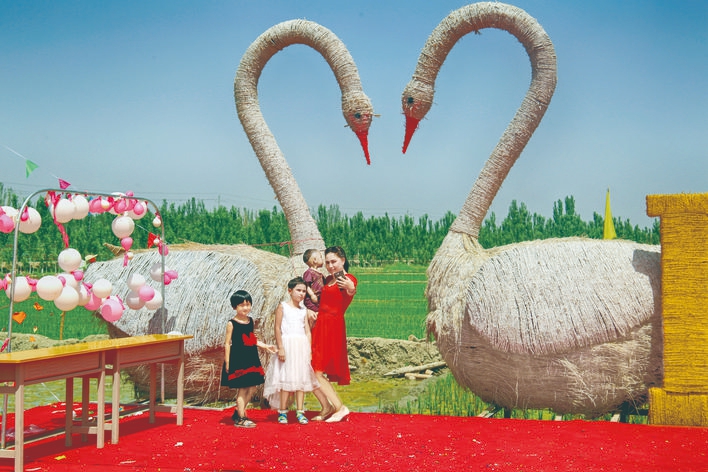By Ardak, People’s Daily
A straw-themed park in a village in Northwest China’s Xinjiang Uygur Autonomous Region has been contributing to advancing local tourism and developing economy.
The theme park, covering an area of about 31,082 square meters and located in Wensu county, Aksu prefecture, southern part of Xinjiang, combines ecological leisure, science popularization and education, as well as agricultural production.
Developing eco-cultural tourism is a priority for Aksu in recent years, said Uthman Turgun, Party chief of the village, adding that the village also wanted to test the water in this field as it boasts a tradition of rice farming and convenient transportation.
Last winter, the village turned its rice paddies into an ice park, and equipped it with skating facilities. The village attracted many tourists and earned 150,000 yuan (about $21,434) in a single month, according to Uthman.
However, the sudden outbreak of the COVID-19 epidemic upset the village’s plan. After discussion, Uthman and his fellow villagers decided to pursue a more stable and sustainable path of developing rural tourism – establishing a theme park with local characteristics.
This April, the village raised over 300,000 yuan and started the construction of the straw-themed park.
The park officially opened on June 1, the Children’s Day. By selling barbecue in the ice and snow park, a villager named Amanguli Amuk earned over 9,000 yuan in amonth. She is confident of making more money as the number of tourists increases.
The theme park has attracted both children and adults, either to enjoy the cartoon sculptures or embrace nature and relax themselves. It also becomes as a great choicefor couples to host wedding ceremonies.
The village is now planning to upgrade the theme parkby setting up entertainment facilities for children, building an outdoor food market, improving the surrounding roads and establishing a cooperative to make and sell straw sculptures.
It is also organizing performances with local features so that tourists could learn about the Uygur customs and culture.
“The profits made by the park will be used to improve the infrastructure in the village and living conditions of the villagers,” said Uthman, adding that the village aimsto build a tourism brand and attract more visitors, thus creating more jobs and generating more income for the villagers.
Wensu county has continuously increased the investment in the tourism sector, especially rural tourism, and explored various activities for urban residents to get closer to the beautiful sceneries and learn about agricultural production in the countryside.
From January to June, rural tourism accounted for 30 percent of the county’s tourism industry, compared with about 15 percent in 2019.












